#i would read tintin and the soviets.
Explore tagged Tumblr posts
Text
this tuesdaypost was drafted on monday, please clap
we are cookin with Gas this week
listening: listened to antimai a few times through, favorite track i think is 'ring 5: middle class'. dorian electra - man to man: really fun video too charasho (benny friedman): was linked in jew chat. very charming and funky. 5 Old French Dances: No. 5. Le Basque (arr. for 2 recorders and harpsichord): i heard this a billion year ago on the radio (my wakeup radio station on my alarm clock is classical) and i finally got around to saving a link for it. very bouncy very cute. makes me think of rabbits running in circles a la beatrix potter.
EDIT TO ADD: i also finally listened to beyonce 'cowboy carter'!! i know im late! it's good i like it! not a revolutionary opinion! obsessed with her jolene cover! that's all!
reading: big one this week! i FINISHED 'the left hand of darkness'! i really liked it! still marinating on the themes etc. i started 'the dispossessed', also by le guin, and am devouring that as well. there's some stuff in there that oof ough. existential. but i'm liking it so far, i'm around chapter 5 right now. physicists!
fanfic: imposter syndrome (mikkeneko): i might have already linked it but i can't be assed to go back through a few weeks of tuesdaypost to see if i already have. so if i did, here it is again. really charming premise, gut-punch of an ending, cool twist on the doppelganger setup from dungeon meshi with svsss.
the articles, some of which were actually read a while ago but i forgot to link and am now cleaning out my phone tabs: how will the golden age of 'making it worse' end? (david roth) new canada policy lets indigenous people reclaim their names (emma bowman) what happens to the stay-at-home girlfriend after a breakup? (erika w smith) unschooling is the parenting trend that's pissing everyone off (ej dickson) in defense of 'coffee badging' (monica torres): if i had a job that was all zoom calls i would literally go insane over being made to go into an office to take zoom calls. fuck that what my mother's wardrobe taught me about style and grief after she died: thinking a lot about all my dad's shit will semen destroy your shower drain? granny davis' geocaching page: found when i was looking at some reviews for caches near my apartment. im kind of obsessed with her. she also has a facebook page called 'granny's geo page' if you don't have a geocaching account. literally she is everything to me. she has found So Many fucking geocaches good god. wedding trivia questions: used as reference to create some wedding trivia for a bridal shower! similarly, the wikipedia page for morganatic marriages my fight with a sidewalk robot (emily ackerman): my school has these. hate them. my boyfriend just linked this to me and im obsessed, laser etched paperweights, i am not a huge paperweight girlie but wowwww prettyyyyy. the electron orbitals!!!! i had a search open for "anti mega #1 cray street". i have no idea what this is.
special edition: the link dump from my trip to the uk last month! some very related to the trip itself, a few random extras! top of the poops, an architectural firm bc i saw a sign with their logo and thought it was cool but now i can't find their logo, waring ader space invaders because i saw someone's shirt with the little space invader guys and was like ooh the tate museum joel meyerowitz (and another page about him) wikipedia on gratin dauphinois, wikipedia page on doncaster for some reason i did not go there list of artworks at the national portrait gallery of scotland wikipedia page on the jacobite uprising of 1745 washi tape that would match the edinburgh one i bought there, tintin in the land of the soviets postcard that i didnt end up getting wikipedia for a quaich which is a traditional scottish bowl, a wiki page on the geology of arthur's seat, a book in the scottish national galleries that i thought about purchasing but didn't want to try and fit in my luggage (she is definitely one of my new favorite artists though) wikipedia page on lauryn hill for some reason not sure how i got there, wikipedia page on salome halpir this post was on tumblr and i tried to find the item in the victoria and albert museum but it was sadly not on display, one of the audio guides i listened to a bit of in the v & a, a scarf i almost bought in the v & a a google search for the fabric library at harrods because my mom mentioned that it existed but i could not find it search for blinq (apparently spelled that way) blossoms because of a cocktail my brother's friend ordered that had one as a garnish wikipedia page on the mechanical explanations of gravitation
watching: from wool to cloth using a historical weaving technique (jillian eve): oughhh colors
emma in the moment/made in the moment: a deep dive into the chunky boy crochet lore the crochet stardew valley pillow drama untangling the shocking tale of mystical creations yarn i tried red heart's new all in one granny square yarn
some crochet tips videos from play hooky with me
tiffanyferg: 'personal style' discourse hgtv is a gentrification masterclass cleantok villains and the morality of messiness
youtube
playing: a teeny bit of wizard101
making: fallow. well i guess i drew on some cards for my friend's bridal shower. but generally fallow.
eating: made deb smittenkitchen's delicious carrot cake recipe. mine was a little ugly but really really delicious. i bought a bag of preshredded carrots and just sort of roughly chopped em up a little smaller because i couldn't be assed to grate them. i also couldn't be assed to trim the cakes, i did two smaller round pans and stacked them up but because i didn't trim them they were a little wibbly. oh well.


i'm going to bake another cake for my brother's birthday next weekend and i'm between her chocolate olive oil cake (looks really easy) and bittersweet chocolate and pear cake (a little more involved but highly recommended by bee)
misc: my mom wanted to take a sailing class but didn't want to do it alone so she offered to pay for me to come. sure, said i! i have never sailed! i like learning new skills! reader, it is So Fucking Hot Outside. the wind died and we had to get towed back to shore. the sun was so strong. there are so many ropes with all different names and they all Do Something. sunday's class got cancelled/rescheduled because the weather was That Bad (hot as fuck and no wind) so we're doing it probably friday instead (and saturday. and sunday. it's two weekends in a row of both days at 9am yayyyyy) but i just hope the weather is. better.
4 notes
·
View notes
Text

I’m also going to post the OC drawings that I posted on my main blog, since this would be a fitting place to put my Tintin OCs in.
So, as I did before, here are some new Tintin OCs I’ve made.
First up, we have Martin.
Martin is Tintin's twin brother. He's a socially awkward book nerd who's equally adventurous as his brother Tintin. However, he prefers to be on the safe side and try his best to keep himself (and Tintin!) safe. Then he slowly becomes more and more adventurous like his brother.
Some more info about Martin below:
In coming up with Martin's concept, I envisioned Tintin and Martin as basically being the Herge versions of Mario and Luigi. Tintin is especially protective of Martin because he cares deeply about him. Though they often have their occasional sibling rants and arguments, they both love each other as brothers.
Notes:
Since some people headcanon Tintin having been born around the 1910s at least, I headcanon that both Tintin and Martin were born on the same day in 1914-15 (I think?).
Martin was born at least twenty minutes after Tintin, making him slightly younger.
He does have a bit of quiff in his otherwise curled hair. (which might be a pretty good disguise advantage if the two had to switch places for a mystery???)
What really sets Martin apart from Tintin is his glasses. As a kid, he started having vision problems due to his nearsightedness. So he got glasses.
Additionally, Martin has a severe peanut allergy. But he didn’t notice it until he was seven and accidentally ate some peanuts with chocolate. After he was treated, Tintin and one of the orphanage administrators were told that Martin had an anaphylactic reaction to the peanuts he ate. During this time, the concept of allergies was relatively new, so Tintin wasn't sure what this meant.
But until adulthood, Tintin had made it clear that he had to keep Martin from accidentally eating peanuts. Which meant that he had to literally ask if a food had peanuts while they were eating out, prep his meals any time he visited, and regularly obtain his allergy medicine.
Additionally, Tintin has had to carry around syringes with Martin’s antihistamine formula for emergencies. I plan on doing a short comic explaining this…
Martin is a total bookworm, and he spends most of his time reading. This has often led to people thinking he's a weirdo, since he's always got his nose in a book. Which kind of annoys Tintin, because he doesn't like people thinking Martin is weird.
As kids, both Tintin and Martin have had their fair share of bullying. Tintin was often seen as the problematic child, because he often picked fights with the other kids. But often times, this was usually out of protecting Martin.
And whenever Martin tried to protect Tintin from his bullies, it usually resulted in him getting hurt bad in the process. Because he wasn’t a very strong fighter.
He likes going on adventures, but isn’t so used to the kind of adventure that Tintin goes through. He’s easily surprised by guns, bombs, and whatever kind of shit Tintin encounters on a daily basis.
Here's one headcanon I thought of in coming up with Martin's character that I thought would be an interesting tie-in to Tintin's first adventure: When they worked together at a local journal, Tintin and Martin were both candidates for an opportunity to travel abroad to Soviet Russia and do some on-the-field reporting. However, because there was only one available spot, Martin allowed Tintin to take it because he didn't feel like he'd be cut out for the job.
Martin lives in the same apartment building as Tintin, but he lives two stories above him. But on special occasions, he spends the night in Tintin's apartment. Mostly because he likes spending time with Snowy.
Aside from reading, Martin likes baking, as well as drawing, bike riding, and crocheting.
Martin is an absolute pro at crocheting. He’s good at crocheting, and anything he makes will be a gift for either Tintin, Snowy, or their friends.
So this is pretty much what you need to know about Martin.
Stay tuned for more Tintin fan OCs!
5 notes
·
View notes
Note
No no don’t be sorry, this is an excellent addition! Thanks especially for the Russian history, I wasn’t sure about how much French and/or English would be spoken in the Soviet Union!
Personally, I think he would have also picked up some Spanish along the way, considering he travels to South America at least three times, and the odds of everyone he meets speaking English/French is unlikely. Especially the Incas who were isolating themselves. They might speak Spanish, considering they do spend time in the Peruvian towns, but I’m not so sure about English or French. I’d have to check again, but I’m pretty sure that even Chiquito, who’s travelling with Alcazar in Europe only speaks Spanish.
He’d definitely know some Arabic too, since he travels to Arabic-speaking countries so many times (I can think of at least four albums where he visits a country that speaks Arabic?). Like he could probably get around with English and French there, especially at the time he would be travelling in, but I think he’d also end up picking something up from the locals for sure.
I also agree about Tintin speaking some Chinese dialect (I seem to recall reading somewhere that Mandarin wasn’t the most widespread dialect at the time, but no clue what he would be speaking exactly), though I’m not sure about Syldavian. He certainly doesn’t understand the two Syldavian farmers he meets after falling from the plane, so either he’s a very fast learner, or they’re speaking another language entirely.
But yeah, he’s probably not 100% fluent in all the languages, but knows enough to get around just fine.
doesn't tintin always speak french because he visits colonies
Not necessarily. Of all the countries he visits, the only ones I can think of that would be French or Belgian colonies are Congo and Morocco (Bagghar, while fictional, is said to be located in this country). Shanghai had a French concession, though whether that's the one that Tintin visits (as opposed to the British concession for example) or not is unclear. And he does visit French-speaking countries in Europe (Switzerland and France) where he presumably is speaking French. But they're far from being the only ones he visits.
As for the other countries he goes to, some are English colonies (Egypt, India) or former colonies (US), so I don't think they'd necessarily speak French there. Not to mention that he also visits South America a couple of times and the characters from the countries he goes to are shown to speak Spanish (think of General Alcazar exclaiming "Caramba!" or Zorrino calling him "señor"). It's not a stretch to believe that there might be people who speak French there, but it certainly wouldn't be the norm. I doubt the Incas were speaking French, tbh.
For the fictional countries, it's harder to say. Khemed could have at some point been a French colony, but it's never specified, and both Syldavia and Borduria have their own (possibly Salvic?) language, though again, it's possible that they know some French (King Muskar might have spoken French, for example, it having been the language of European courts for centuries).
Anyways, aside from all that, both Tintin and Haddock canonically speak English; it's especially obvious in the French version of Tintin in Tibet, where Tintin actually switches to English to ask for directions and Haddock asks some kids if he can eat the peppers in English.
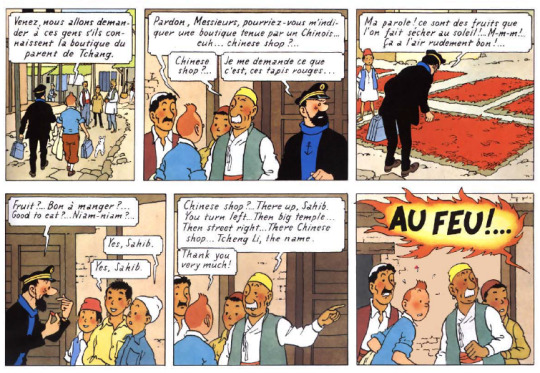
It does admittedly suggest that they do speak French most of the time and that switching to English is notable enough to be written out explicitly, though it's hard to say for sure. But Tintin definitely doesn't only visit francophone colonies, so if he's speaking French, it's not (solely) because of that. It's more likely just something that we're supposed to ignore as readers.
#I could probably write a whole essay on why i think he speaks certain languages but i wont lol#but yeah he definitely visits countries that dont speak french or english so he's gotta know more languages#tintin
83 notes
·
View notes
Text
perhaps my problems began when i was 9 and i read nothing but tintin and the soviets for about a year.
#there is actually a story here but basically i was on a mission to read every tintin comic (admirable ambition for a 9 year old)#and my father would take me to the library every couple of weeks or so and i would pick out a new one.#and then one time i was like. i want this one (the afformentioned tintin and the soviets)#and i was like...weird how its not in colour and capitan haddock is not in it and also i dont know what a soviet is because im 9#and i live in small town new zealand but i digress#i burrowed this comic#and then for a year we didnt go back to the library. we werent banned or anything#and dad would still take us to do other interesting things on the weekend like go to fairs or swimming or to the beach or whatever#but for a year. we had tintin and the soviets and whatever book my brother had burrowed#im sure our late fee was astounding#but anyway. for a year whenever i wanted my tintin fix (abt once a week or so in order to supplement my onging mental tintin fanfiction)#i would read tintin and the soviets.#funny thing is i can no longer remember the plot just one or two frames of tintin breaking his nails opening a trapdoor#the political commentary was lost on me because once again: i was nine#anyway then we went back and i got the calculus affair which was my fave because tintin got fuckt up#whumpers gonna whump i suppose
4 notes
·
View notes
Text
Mini-Essay: How Old IS Tintin?
Tintin’s “real” age comes up a lot in fandom discourse for one reason or another, usually out of concern for his safety. Nothing has really been set in stone aside from some brief mentions by Hergé himself...he has said Tintin is “around” 15-19, likely keeping it open so more people could put themselves into Tintin as they read the comics. (The series’s original tagline was “For ages 7 to 77″, after all.) For archival reasons, I’d like to do an analysis of what age bracket Tintin is likely in, based on historical reference from the earliest possible point in the franchise.
There are two important things to note when examining Tintin on his earlier journeys (specifically Soviets and Congo). 1. Hergé was 22 when he created Tintin in 1929. He was young at the time, so when tasked with making a character for a children’s magazine (Le Petit Vingtieme), of course he would envision a person younger than himself at the time. This is a pretty average thing for character creators...when he was younger, he came up with younger characters, but as he got older, he primarily created adult characters for an adult-filled world. 2. Tintin was at least partially inspired by real life teenage journalist (and boy scout) Palle Huld. Hergé has specifically said Tintin was around the age of 15 when he first created him, the same age as Huld, so that’s the youngest Tintin can possibly be.
It’s important, though, not to take these first two books seriously, because both of them are inherently silly (aside from the blistering racism of Congo) and any serious situation in these stories is immediately avoided by Tintin using Troll Physics. However, what really stands out for me in Soviets is when Tintin flies a plane. He’s confident doing so, but is not an actual pilot; historically, people in Belgium can begin flight training at age 15. Meanwhile, a person must be at least 17 to begin training for an automobile driver’s license, and 18 in order to drive. Historically in Russia, a person could start driving when they were 17 years old. Later in the story, Tintin buys a car, so again, this pushes him up to age 17-18.
Later on in Soviets, Tintin is given champagne at the German Aerodrome after landing his plane. In Germany, an individual must be at least 16 years old to consume wine (and sparkling wine) without a parent or guardian being present. I highlight this also because Hergé and his surroundings at the time were staunchly Catholic, and Catholics are traditionally advised against excesses, be it food, pleasures, or alcohol. Again, it would be uncharacteristic of a Catholic to portray underage drinking, let alone in a comedic manner.
Now, let’s jump ahead in the timeline. We begin to see Tintin living in his own apartment, and driving motorcycles and mopeds. People in Belgium can start driving mopeds at age 16, and historically, it was stupidly easy to rent an apartment from an early age. It was just as stupidly cheap; here’s New York City’s rent prices over the decades as an example. Basically, if Tintin were being paid enough as a reporter, he could easily make his two-digit rent costs. (Yes I’m slightly envious.)
In Cigars of the Pharaoh, Tintin flies a plane again. This implies he could have gotten his final Practical Check, which grants him a pilot certificate; a Belgian citizen must be at least 17 in order to get this. He’s also now notably better at flying the plane, too, and only crashes when it runs out of fuel.
Jumping ahead to The Black Island, we see Tintin going into a pub in Scotland...this is where things get complicated because he is given a mug of beer, and then orders food. Historically in Scotland, you must be at least 18 to buy alcohol at a licensed establishment. However, some places allow 16-17 year olds to buy alcohol with food or a meal. Tintin is given the mug of beer before he starts ordering food, though, so I’m going to place him at least 18 by The Black Island.
The TL;DR on this one is that Tintin is about 17 at the very, very start of the series. By approximately the 7th book, he is for sure 18 at least; any further indications to his age are left vague, likely by Hergé’s intention in order to keep Tintin as accessible a character as possible. What is the passage of time like in this universe? We don’t quite know, since it’s a floating timeline, but I doubt Hergé ever intended to put anything 100% in stone.
Finally, shout-out to the American distributors of the 1960s Belvision animated series for the most insane read I’ve seen on Tintin’s age:

62 notes
·
View notes
Text
Whumptober Day 20 - Fetal Position
Twenty: Fetal Position
A/N: A very short prequel to my day 2 prompt ‘Caged’, but can be read as a separate story. Set during ‘Alph Art’.
The cellar was cold.
In fact, this cellar was freezing cold.
Despite having once slept in sub-zero temperatures, half-starved and dehydrated on Mount Everest, Tintin still decided this cellar was worse. He was grateful he’d at least had the sense to wear his sweater before leaving his hotel room, but lying on the cement was not doing his body temperature any favours. They could’ve at least given me a blanket. Even a potato sack would be greatly appreciated right now.
He raised his head to gaze at the window above, the faint twinkle of heavenly bodies glittering in the night sky. A quick glance at his watch revealed it was just gone two, and yet he’d hardly slept a wink. And I would’ve been comfortable in my own bed if I’d only been more careful…
It had pained him to send Snowy with a message, for he desperately longed for the warmth and comfort of his faithful friend’s fur. The canine had been reluctant to leave his master’s side for any reason, though Tintin was confident that he could deliver his call for help successfully. After all, Snowy has never let me down. No reason for him to let me down now…
Then again, I did send him a few hours ago. How deeply asleep is the Captain?!
Sighing heavily, Tintin forced himself onto his side, tucking his legs to his chest as he wrapped his arms around them. He’d pulled the sleeves of his sweater down as far as they would stretch, but it did little to alleviate the chill that continuously swept through his body.
Part of him began to wonder if he had done the right thing, running off to investigate in the middle of the night. It was times like this that he forgot he wasn’t as young as he once was, and therefore not as sprightly. That hadn’t appeared to be the case this time, however, as he knew he would be able to sprint to safety had there been no bars on his window.
However, he couldn’t help but feel guilty for not informing Haddock of his intentions. After all, the Captain is bound to have a heart attack once he reads my note. The older man had berated him on more than one occasion about how Tintin was going to be the death of him: “Stop gettin’ yourself shot and kidnapped already! It’s been going on too long, lad.”
Too long indeed. He couldn’t believe he’d barely hit puberty when he first began his first assignment in the Soviet Union, running away from soldiers who were more than double his age. Now he’d matured into a world-weary, scar-ridden young man, who was beginning to think it was time to put the typewriter away.
An owl hooted above his window, the sound echoing around his cell.
He stared dejectedly at the ceiling, counting the number of small cracks and crevices that snaked along the surface of the concrete. Is that a crevice or a bullet hole?…
******
“Hey, mister!”
Tintin startled. He didn’t remember falling asleep. When did he fall asleep?
“I'm talking to you, mister. Look at me!”
The reporter rolled onto his back, hoisting his torso upright to stare at a trio of unshaven, muscular henchmen. All were brandishing handguns pointed directly at Tintin, and none looked impressed to see him.
Correction: none looked impressed to see him still alive.
“Get up,” The burly henchman jerked his gun impatiently at the reporter. He gave a toothy smile as the trembling young man slowly rose to his feet. “It’s time to make you into a César.”
Tintin swallowed hard as he was escorted out of his cell, clenching his fists to stop his hands from shaking. The Captain will save me…he always has. He always will.
#tintin#the adventures of tintin#adventures of tintin#fanfic#fanfiction#whumptober#whumptober2022#whumptober 2022
6 notes
·
View notes
Note
Just a quick question but what often gets you inspired?✨
Oh boy ehhhhhh - here we go to the never ending rabbit hole!!
Sometimes small things gets my attention like e.g. squirrels paws, unique red face of a person at a cold day or seeing chair upside down on icy lake (honestly I am now working on long comic about trolls inspired by that chair).
Comic art and animations inspires me greatly! Lately I have been inspired by animations gems like the thief and the cobbler, treasure island from 1988 (and other Soviet Union animations) and the king and the mocking bird. The animation process fascinates me greatly, how can one make smooth and imaginative animations is wonderful! I can't get enough of it all.
Also concept of kindness inspires me greatly. I have gone throw...lets say a lot. I love stories that show kindness where it is needed, e.g. Tove Jansson's story of invisible child. The child was bullied by their family so much that they turned completely invisible and lost their own voice, eventually they found confidence and selfworth in themselfs thanks to kindness of Moomins. I want my feelings to be seen and heard but sometimes world or people are overwhelming. Kindness is important, otherwise we will fall apart or at least I do. I am still on my way to be kind and understanding of myself and othets but those qualities are more important to me than ever.
Couple weeks ago I started to collect stuff that inspires me or I find interesting. I will list most of them below. If I am not saying anything about certain box, it means I enjoy the show/comic/meme/animal but cannot put my finger on why. Usually those make me smile and give new pespective about life. Somethings might be there twice because I am forgetful baboon!
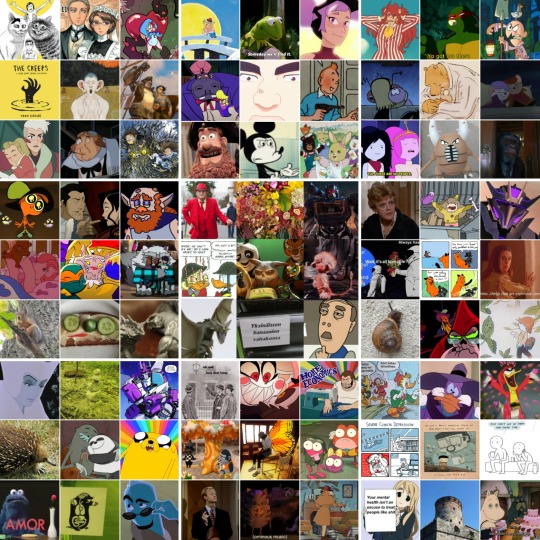
Junji Ito's horror comics are visually out of this world! But my fav is his humorous comic about his cats. It was so different from his other comics that I fell in love with it.
Emma manga made by Kaoru Mori. Usually I can't stand romantic stories but the characters but the story and the art works perfectly together in her comics.
Comics and animations of @cecameron are gorgeus and fun!
Tove Jansson's books, comics, art and life in general.
Rainbow Road from Muppets is my favourite song and I wish it would be played at my funeral one day. Its hopeful song that fills me with joy.
Entranta from Shera. She never gives up, I wanna be like her! I wanna see failure is part of the process and helps me get further little by little + its nothign to be shamefull of.
Ponyo's fathers frustration is relatable, also the whole movie is wonderful and colorful. Its maybe my favorite ghibli movie.
Scarr my beloved weirdo! The image was in the tarot pack of the grim adventures of Billy and Mandy and he is of course the hermit (which is my personality card)
@deep-dark-fears comics surprise me by giving new ideas to express fear.
Hugo Simberg was Finnish artist at 1900's. Symbolism and sympathetic characters of devils and death has inspired me since I was 8 years old.
Treasure planet is one of my favourite disney movies. The father son relationship between Silver and Jim is great and makes me cry everytime.
Hypnopotamus and Warren Stone from ROTTMNT. Their relationship is wholesome and inspiring + the show itself is fun, full of action and passion! I love it!
Tintin comics are almost religious in my family. It was one of the first comics I saw different from different parts of the world and how tintin could become friends even the most oddest (looking at you captain Haddock) people is marvellous.
The penguin my belowed ❤❤❤
Mörkövahti is Finnish children book that accidentally inspired me greatly. The world of troll like creatures, magical elements in the story and research of the creatures made me fall in love in the world of the books. I often love to read books for kids or teens, they are more interesting and I don't have to fear to be faced with rape, sexism and other nasty stuff.
Stop motion animation and expecially Arman animations have been always part of my life. I have soft spot for the pirates movie thanks to it's humor, naivety and animation style.
Adventure time is one of my favourite series and couple of things stuck with me. Some people are build different, you don't have to understand it but you need to respect them. I love this idea greatly and I try to live by it.
Pinsir is my favourite pokemon and it says a lot.
Mr Pogo and other smart ape characters inspire me greatly. No wonder new planet of the apes trilogy is part pf my movie collection. I am not sure why I love smart apes as characters but it always works.
Wander over yander whole concept is to be kind and help people out, I love it.
Peto was made for me by @elle-eedee at lgbtq trolls discord server. Peto ended up becoming my ultimate comfort character and I love to draw him and make stories for him. I loved the way elle-eedee combined my favorite things to create him ❤ also their colorful art inspires me everyone I see it.
@alioutfit blog is blog of style choices of man named Ali. I want to find my own style like Ali.
The murder she wrote is nostalgic for me and I wanna get into that series again! The fact smart older woman is the main focus inspires me. I love Agatha Christi stories too so it checks out.
Hugs + rottmnt. I love hugs and the show has a lot of good hugs!
Don Rosa's Donald Duck comics are the best! Those who don't know, Donald Duck comics are big in Finland!
Heikko Peikko (meaning Weak Troll) was stop motion animation series in Finland at 70's. Its wonky, basic and charming story of Heikko Peikko's everyday life.
The meme that made me less depressed
@foxing_around had wonderful comic that made me think over my friends over my sad ass.
Squirrels, I like them a lot. They remind me of my grandpa who loved forest and nature.
My sandwich with a face
Monsters petting each others! My friend has a lot of arkham maddness board games that comes with monsters. I like to play with the figurines, they are so lovely monsters!
Concept art of toothless from how to train your dragon. Why toothless couldn't look like this little ugly thing??? I would have loved him from bottom of my ❤
Kingdom of lonely bananas sign was at supermarket. Little imaginative ideas like these are great.
Pasila series is good stuff, it was said to be Finnish South Park.
My photo of snail ❤
WoY faces are glorious
The snow queen movie from 1957 gives me live. Its one of my favourite Soviet Union animation movie.
My photo of my special secret place at summer
I know only these two from Transformers comics and their love is wonderful. Truly I haven't read the comics...I wish I could tho!
Sherlock Holmes books are awesome
New ducktales series had so many characters from the comics I couldn't believe it at first! Finally I had my favourite characters like Fethry on the show!
I love odd looking animals because I am one too
Animal Crossing is a game I thought I would never play. It looked like a baby game when my big bro gave the it to me at the time gamecube was new console. He bought it because it had a memory card and he know nothing about the game. I tried it and never looked back ❤
The ping pong animation is my favourite animation series from Japan. I got the manga even I can't read it since it's straight from Japan. It's more about the lifes of the characters and how they grow as people than the game itself (or at least it feels like it). The story feels real in a way, that the characters are three dimensional and their reactions are natural. Some charachters stop developing as players, some loose interest completely, some work hard to be the best, some forget why they played in the first place and some found new ways to live their lives. The story is good for my soul.
Comic of @catmilks made me realise there are other people like me. The feeling of the comic is relatable and hopeful, things will pass and life goes on + make sure you take care of yourself.
Comics of @ stuffnoonetoldme made me reflect my life and how I see myself.
@diva-humon has good points of life. I realised I have very christian way of thinkin even I am not religious or have ever been part of any religios.
Suomenlinna, I loved it!
6 notes
·
View notes
Text
Tintinizing India - A story of life
If you are a Bengali who thrived when a misguided economic well-being did not threaten your mother tongue to its core, there is absolutely no chance that you have not been a part of the love that we always showed for detectives. We had our own Byomkesh, Feluda, Kiriti Roy, we had Sherlock and his overtly British demeanour. All of them possessed certain traits that were either something we had or something we desired. But among them, was an intrepid reporter from Brussels, who, without being something resembling our desires, burst into fame and remained famous ever since. The impact was so huge that it startled the creator of the character itself. He, always proclaiming that Tintin was his soul and that the character will cease to exist after him, was shocked by the love Tintin received from this tiny part of the world.
"I receive a lot of mail from India. Here, in my office, are two letters from Calcutta. Now, what can there be in common between a boy in Calcutta and myself?"
Why or how this tryst with Tintin started, is still a mystery to me.
In fact, the whole of India has always been a big admirer of Tintin. So much so, it has been such a crowd puller that Sony decided to release Spielberg’s Adventures of Tintin (2011) in India six weeks before it’s official release in USA. The movie still stands to be the highest grossing animated film in the country and also the animated feature film to receive the biggest opening ever. The comic books, adapted in Hindi around 2010, became and instant success and still remains to be one of the most sold comic series of all time.
However, that has not been the first time when Tintin spoke an Indian Language. Thirty years before it’s Hindi translation, Tintin was translated in a Bengali magazine, called Anandamela, for the first time. Aveek Sarkar, the same person who recently became famous through the comments made by our honourable CM, was the person who travelled the distance to meet Herge and ask for the rights to translate Tintin in Bengali. Till today, all the 23 translated versions released by Ananda Publishers remains to be an essential part of a Bengali childhood. Coincidentally, the first time I came to know about Tintin was not from one his stories or any news article. It was through one of my childhood heroes, the detective I have mentioned previously, Satyajit Ray’s Feluda. Ray, one of the biggest representatives of Bengali mindset, was a huge admirer of Tintin himself. His wonderfully woven brainchild Feluda, not only speaks about Tintin in several occasions, but somehow loosely resembles him in a lot of ways.
But why has Tintin always been so impactful? To answer that, we must know who Herge was, in what period was Tintin created and what were the stories trying to tell. Being born on 1907 in Belgium, George Remi a.k.a Herge was always destined to be living in midst of everything the three unimaginable decades presented the world with. Yes, Herge was there all through the world wars and was allegedly arrested for being a Nazi collaborator. Tintin was first published in 1929, but his story starts before that, when Herge started creating illustrations for the first time. Sources state Herge started creating illustrations during his school days as a protest against the German troops who occupied Belgium back then, during the First World War. However, the first notable published illustrations of Herge was about a boy-scout named Totor, who was inspired from his teen days as a boy scout. We can, therefore, safely assume that Totor, was the stepping stone that eventually lead to creation of Tintin. But that is not the same version of Tintin we all love and admire. The first three books (Tintin in the Land of Soviets (1930), Tintin in Congo (1931) and Tintin in America (1932)) were created with the initial beliefs that Herge possessed. Land of Soviets was about the ills of communism whereas Tintin in Congo, a brilliant portrayal of the diamond mining in Africa, was in itself way too racist than what is acceptable today. Tintin in America was a masterpiece though, and it was the one that perhaps cemented Tintin’s position in the world on Comics. The books portrayal of Native Americans, the Al Capone resemblances along with the attention to details makes it the most selling telling book till date.
Then, in 1934, came Cigars of Pharaoh. For the world, it introduced Rastapopoulos, Tintin’s nemesis and who’s similarity with stereotypical anti-Semitic portrayals will be talked about for a few decades. For us, it introduced India through Tintin’s eyes when the reporter’s plane crashed in a deep forest and he had to find his way out by becoming the official doctor of an elephant herd. The caricatures were what you can expect from a European of that time. The main villain is half-naked Fakir who throws darts mixed in a poison called Rajaija and makes the victim mad. The king of Gaipajama opposes opium trade and almost dies, Snowy is almost killed for abusing a holy cow. Not the ideal eh? So, anyone with the slightest idea of the rift between India and China can understand what comes next when the poppies are mentioned. But that was never the case. Why? Because in order to study the Orient, Herge was introduced to a Chinese named Zhang, the man who later became his best mate and can be credited for helping Tintin find his way.
The Blue Lotus (1936) starts where Cigars of Pharaoh ended and talks about the real China that was never talked about. Starting with the opium trade, Herge slowly shifts away to talk about Japans invasion of Manchuria and eventually, the second world war. The portrayal in so overwhelmingly wonderful, specially from an outsider, that it can be categorised as masterpiece similar to Spielberg-Christian Bale’s magnificent storytelling of Empires of the Sun.
Before WWII started and Belgium surrendered to German invasion, Herge wrote two more books (The Broken Ear and The Black Island) where the narrative primarily focused on adventure rather than politics. In 1939, just when the world prepared for WWII, Tintin saves Syldavia from a fascist leader in King Ottokar’s Sceptre. But the war meant Herge would eventually work under Nazi supervision and that was the case. Tintin goes up against a rich American Jewish man in The Shooting Star (1942). However, the books that followed this, namely The Secret of the Unicorn and Red Rackham’s Treasure (1943-44), are considered to be his best works. Soon, WWII ended and Herge became a free man of the free world. Only, he was barred from creating Tintin because of his status as a Nazi collaborator.
Have you heard of a parody called Tintin in the Land of Nazis?
Fortunately, though, the world was lenient on Herge. After few years, he was allowed to write. Then came the Seven Crystal Balls (1948) and Prisoners of the Sun (1949), where Tintin meets the Incas. Land of the Black Gold (1951) talked about oil crisis way before it’s time, Destination Moon and Explorers on the Moon (1953-54) made Tintin walk on moon way before Armstrong, Calculus Affair(1956) showed us cold war and Tintin in Tibet (1960) was all about finding a lost friend Chang (or, should we say Zhang from China?). Herge was so magnificent with his imagination as well as realisation of the world, the none of these stories fall out of place when compared with real history. Here, in Tintin in Tibet, we see a picturization of a New Delhi bazaar, so accurate and mesmerising, that you can almost forget the pent-up anger from what you read about India previously.
So, after all this, why do we Indians still love Tintin when we are so bored to talk about the World Wars?
Maybe it is because of how we have lived over the years.
We, the modern Indians, are descendants of countless wars that waged within our boundaries for centuries and still, our recent history is all about the 200 years of colonialism and small battles for the sake of independence. In that time, towards the end of the British rule, the world wars waged from America to Turkey to Japan. We were the biggest army of WWII and yet none of the folklore reeks of India. So, like Eve’s never-ending quench for the forbidden fruit, we have always been attracted to the politics around the world that never affected our daily lives. Be it the world wars, the oil crisis or the cold war. Heck Armstrong is perhaps more popular than Rakesh Sharma today. That is what precisely Herge did to us. He talked about the biggest crisis in simplest of way. It was a mixture of satire, truth, fantasy and romanticism. We drank it all.
Or maybe it is because of what Tintin resembled.
He was not a superhero. He was a decent looking reporter from somewhere beyond kaalapani, who has no ill vices, does the right thing, dresses neatly and most importantly wander in the land of unknown without any fear. He has a job for which he earns enough money to sponsor his trips, without a father asking him about his goals in life and a mother asking him to tie the knot. Plus, he does not talk about romance, neither mentally nor physically. Isn’t he the perfect gateway to the dreams we have always dreamt for ourselves? In Bengal, he came early with the taste of wanderlust, mystery and subtle remarks about politics. The three things that catches our imagination within a second. Moreover, being an ideal representation of a Bengali mother’s perfect child helped him fly into a little child’s bookshelf. From where he never disappeared, just got passed down from one generation to the other.
Moving out of the literature, let us talk about the technicalities. With his brilliant brush and realisation of perspective, Herge talks about the society at large, it’s functions, barriers and all those hard terms an economist use in a such a simple words and pictures that makes you feel at ease while brushing through them. You don’t realise, but your subconscious does and stores it, and redirects you to that same picture over and over again. Remember the brilliant picturization of Moon, the detailed underwater see through the shark-shaped submarine, or, my favourite, the wonderfully detailed picturization of a make-believe Inca King’s Diwan-e-Aam when Tintin and co. accidentally barges in. The side characters did their part as well. Haddock was as funny as he was serious. He was honest, comical, painfully drunkard, yet something about him made you follow his footsteps. Or else, billions of blistering barnacles will head your way. Calculus was genius lost in his own life. Bianca was ever-reliable, Thompson twins were the ever-humorous.
Tintin was a mixture of everything.
He taught us politics, he taught us history, he taught us science, astronomy as well as companionship. Personally, he taught me what quarantine stands for, where llamas are found, why an elephant trumpets, why glasses break when Bianca Sings. He was also my primer to calculus.
For nation that has always aspired more than it could grasp, a small Polynesian boy became the ray of hope and continues to do so, with flying colours. For the young kids who either loved or hated to read, Tintin gave their imaginations the fuel it required.
So, as an ode to the millions who tread this path before me, and to the billions to follow after, I hereby raise my toast to celebrate yet another product of the war-stricken days. The one which made us believe.
Credits :
1. India's undying love affair with Tintin - Soutik Biswas, BBC(2011)
https://www.bbc.com/news/15680397
2. India first for Spielberg - Robin Bansal, Hindustan Times(2011)
https://www.hindustantimes.com/hollywood/india-first-for-spielberg/story-IrjJzfKtVzn53XCfC5URAL.html
3. [VoxSpace Selects] The Boy In Blue – 90 Years Of Hergé’s Tintin - Puja Sinha(2019)
https://www.voxspace.in/2019/01/30/tintin/
4. Tintin in India: The epic that wasn't - Atul Sethi, TOI(2007)
https://timesofindia.indiatimes.com/india/Tintin-in-India-The-epic-that-wasnt/articleshow/2094744.cms
5. All Wiki Links.
Rastapopoulos : https://en.wikipedia.org/wiki/Rastapopoulos
List of Tintin media : https://en.wikipedia.org/wiki/List_of_Tintin_media
The Adventures of Tintin : https://en.wikipedia.org/wiki/The_Adventures_of_Tintin
Tintin(character) : https://en.wikipedia.org/wiki/Tintin_(character)
6. Basic Information Help : http://en.tintin.com/
7. A Tintin timeline: https://nationalpost.com/afterword/a-tintin-timeline
8. Dark Secrets Behind the Creator of Tintin : https://www.youtube.com/watch?v=wUvxC8Qf3Bw
6 notes
·
View notes
Text
Tintin in the Land of the Soviets
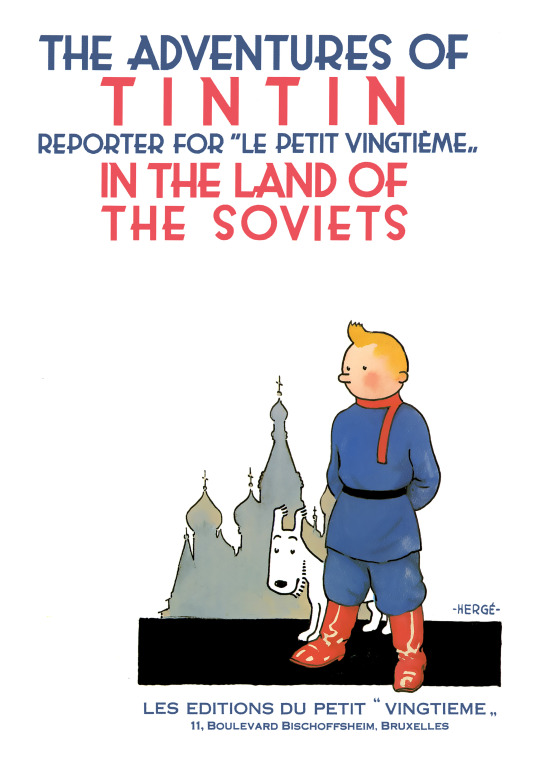
THE ADVENTURES OF TINTIN: IN THE LAND OF THE SOVIETS 1930 BY HERGÉ
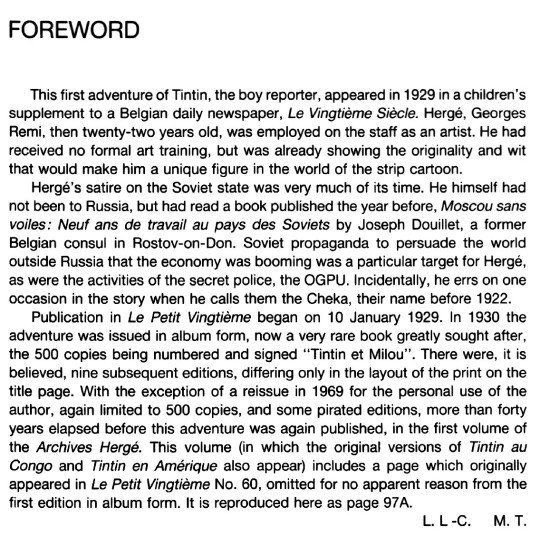
CRITICAL RECEPTION (FROM WIKIPEDIA)
In his study of the cultural and literary legacy of Brussels, André De Vries remarked that Tintin in the Land of the Soviets was "crude by Hergé's later standards, in every sense of the word". Simon Kuper of the Financial Times criticised both Land of the Soviets and Tintin in the Congo as the "worst" of the Adventures, being "poorly drawn" and "largely plot-free". Sociologist John Theobald of the Southampton Institute argued that Hergé had no interest in providing factual information about the Soviet Union, but only wanted to inculcate his readers against Marxism, hence depicting the Bolsheviks rigging elections, killing opponents and stealing the grain from the people. According to literary critic Jean-Marie Apostolidès of Stanford University, Hergé cast the Bolsheviks as "absolute evil" but was unable to understand how they had risen to power, or what their political views were. This meant that Tintin did not know this either, thereby observing the Soviet "world of misery" and fighting Bolsheviks without being able to foment an effective counter-revolution. Literary critic Tom McCarthy described the plot as "fairly straightforward" and criticised the depiction of Bolsheviks as "pantomime cut-outs".
Photograph of a middle-aged man speaking into a microphone. Hergé biographer Benoît Peeters considered In the Land of the Soviets to be "joyously bizarre" but also clearly Hergé's worst. "One couldn't have imagined a less remarkable debut." Hergé biographer Benoît Peeters was critical of the opening pages to the story, believing that the illustrations in it were among Hergé's worst and stating, "One couldn't have imagined a less remarkable debut for a work destined for such greatness". He believed that Tintin was an existentialist "Sartre-esque character" who existed only through his actions, operating simply as a narrative vehicle throughout the book. Where Hergé showed his talent, Peeters thought, was in conveying movement, and in utilising language in a "constantly imaginative" way. He considered the story's "absurdity" to be its best feature, rejecting plausible scenarios in favour of the "joyously bizarre", such as Tintin being frozen solid and then thawing, or Snowy dressing in a tiger skin to scare away a real tiger. Hergé biographer Pierre Assouline described the comic writer's image of the Soviet Union as being "a Dantesque vision of poverty, famine, terror, and repression".
Marking the release of Steven Spielberg's The Adventures of Tintin: The Secret of the Unicorn film in 2011, the British Broadcasting Corporation (BBC) commissioned a documentary devoted to Tintin in the Land of the Soviets in which journalist Frank Gardner—who considered Tintin to be his boyhood hero—visited Russia, investigating and defending the accuracy of Hergé's account of Soviet human rights abuses. In an article for conservative newspaper the Daily Mail, Gardner discussed his experience, stating that upon first reading the comic, he thought the drawings crude and the plot improbable. However, during his trip to Russia, he learned from a Muscovite historian that the spirit of Hergé's story was in keeping with what was going on in Russia at the time. The historian confirmed that one of the great tragedies of the 20th century was the wholesale persecution of the Kulak farmers by the Bolsheviks, where "literally thousands perished." First airing on Sunday 30 October 2011 on BBC Two, it was produced by Graham Strong, with Luned Tonderai as producer and Tim Green as executive producer. David Butcher reviewed the documentary for the Radio Times, opining that Gardner's trip was dull compared to the comic's adventure, but praising a few "great moments", such as the scene in which Gardner tested an open-topped 1929 Amilcar, just as Tintin did in the adventure.
SYNOPSIS (FROM WIKIPEDIA)
Tintin, a reporter for Le Petit Vingtième, is sent with his dog Snowy on an assignment to the Soviet Union, departing from Brussels. En route to Moscow, an agent of the OGPU - the Soviet secret police - sabotages the train and declares the reporter to be a "dirty little bourgeois". The Berlin Police blame Tintin for the bombing but he escapes to the border of the Soviet Union. Following closely, the OGPU agent finds Tintin and brings him before the local Commissar's office, instructing the Commissar to make the reporter "disappear ... accidentally". Escaping again, Tintin finds "how the Soviets fool the poor idiots who still believe in a Red Paradise" by burning bundles of straw and clanging metal in order to trick visiting English Marxists into believing that non-operational Soviet factories are productive.
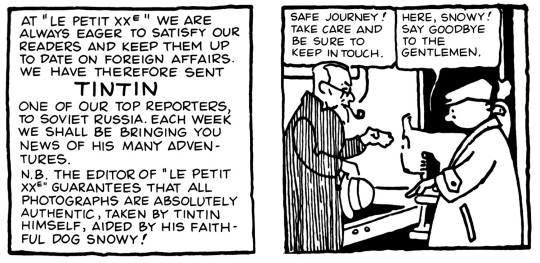
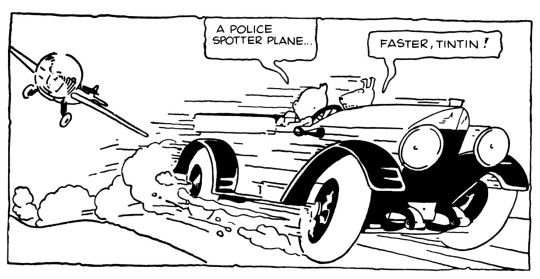
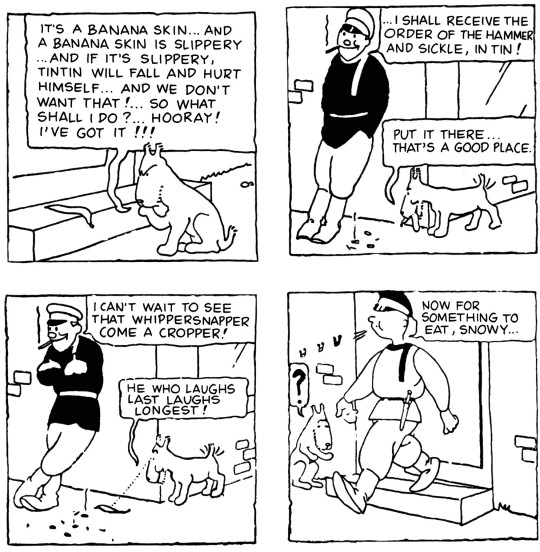
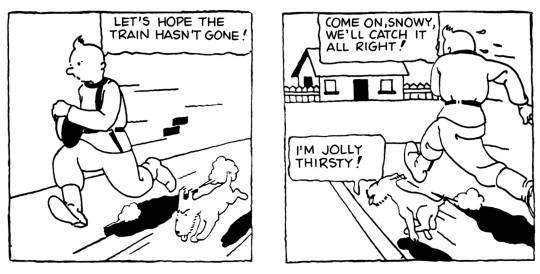
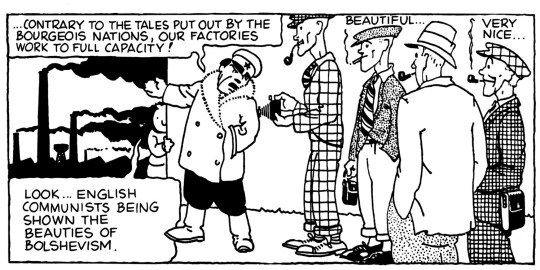
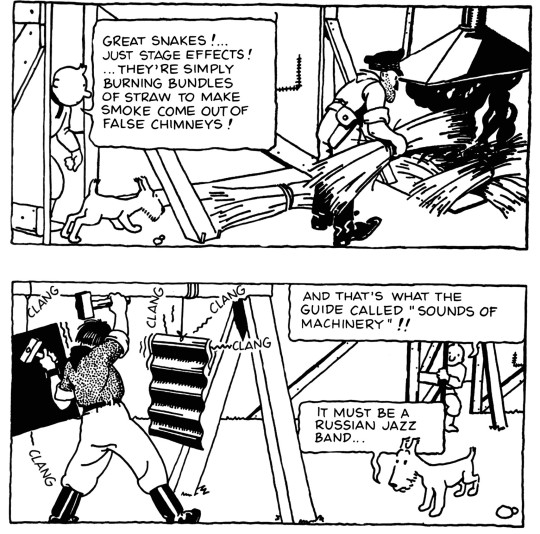
Tintin witnesses a local election, where the Bolsheviks threaten the voters to ensure their own victory; when they try to arrest him, he dresses as a ghost to scare them away. Tintin attempts to make his way out of the Soviet Union, but the Bolsheviks pursue and arrest him, then threaten him with torture. Escaping his captors, Tintin reaches Moscow, remarking that the Bolsheviks have turned it into "a stinking slum". He and Snowy observe a government official handing out bread to homeless Marxists but denying it to their opponents; Snowy steals a loaf and gives it to a starving boy. Spying on a secret Bolshevik meeting, Tintin learns that all the Soviet grain is being exported abroad for propaganda purposes, leaving the people starving, and that the government plans to "organise an expedition against the kulaks, the rich peasants, and force them at gunpoint to give us their corn."
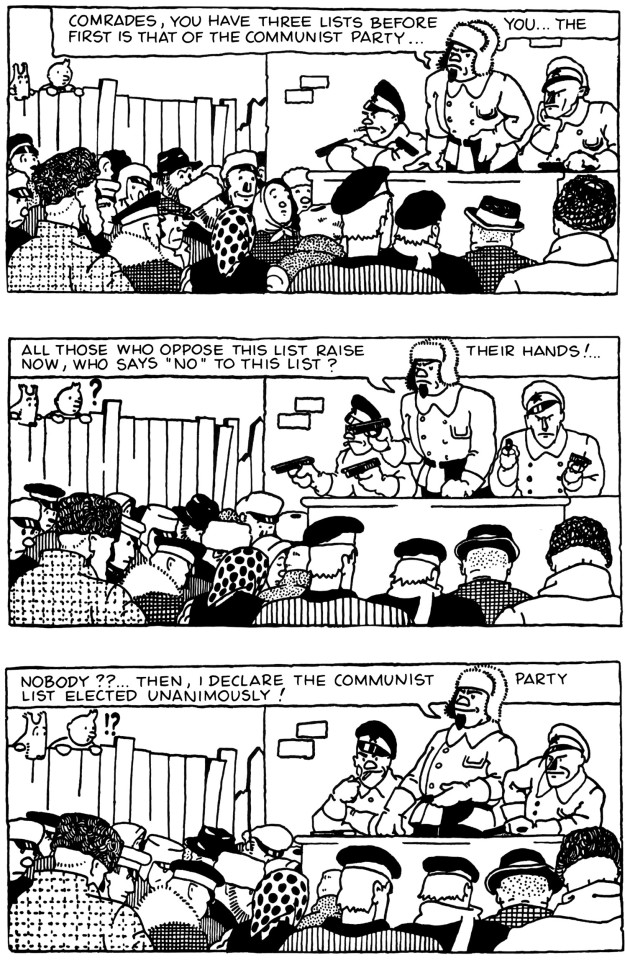
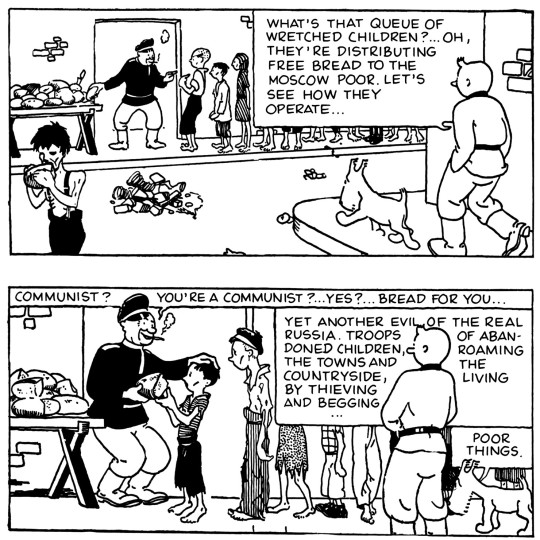
Tintin infiltrates the Red Army and warns some of the kulaks to hide their grain, but the army catches him and sentences him to death by firing squad. By planting blanks in the soldiers' rifles, Tintin fakes his death and is able to make his way into the snowy wilderness, where he discovers an underground Bolshevik hideaway in a haunted house. A Bolshevik then captures him and informs him, "You're in the hideout where Lenin, Trotsky and Stalin have collected together wealth stolen from the people!" With Snowy's help, Tintin escapes, commandeers a plane, and flies into the night. The plane crashes, but Tintin fashions a new propeller from a tree using a penknife, and continues to Berlin. The OGPU agents appear and lock Tintin in a dungeon, but he escapes with the aid of Snowy, who has dressed himself in a tiger costume. The last OGPU agent attempts to kidnap Tintin, but this attempt is foiled, leaving the agent threatening, "We'll blow up all the capitals of Europe with dynamite!" Tintin returns to Brussels amidst a huge popular reception.
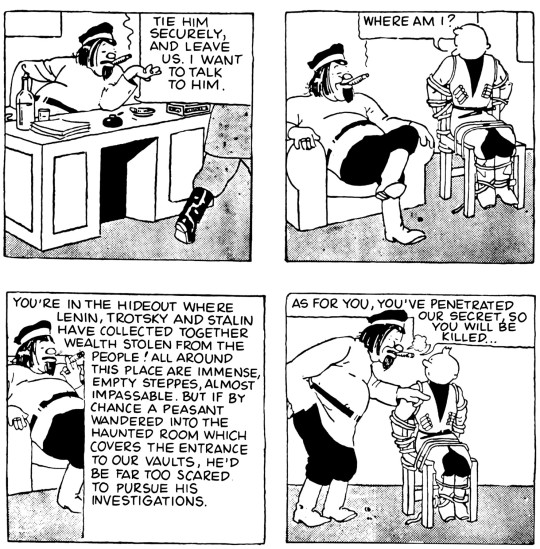
REVIEW
I am used to reading propaganda comics. The american Golden Age is full of racism and nationalism, and it is offending in its bad taste. Now, Tintin in this case was also propaganda in the form of satire, which is actually a very smart way of pushing ideologies. So, people were probably offended by the way the Soviets are portrayed here, and they are correct when they say that there is no investigation about the causes or trying to figure out why they were acting like that. But I can tell you that, coming from the third world myself, where these common practices of communism shaped nations (and kept them from progressing), all the things Tintin sees still happen in the world. More than you can imagine. And we are talking about countries that are part of international organisms. So, while this book may seem “too simplistic” at times, I have no doubt it is realistic.
Also, exploring the causes would probably not fit the publication the comic strip was being published on.
The story, soviets aside, is pretty entertaining and Milou (Snowy) has dog thoughts and dialogues that make him more relate-able.
The style is not there yet. Hergé gets better from panel one til the end. If this is one of his weakest works, I cannot wait to see his strongest.
I give this book a score of 8
4 notes
·
View notes
Text
Hey there!
I'm about to start the project I had in mind when I made this blog - doing a complete read-through of Tintin book-by-book and posting it here! I'll start with Land of the Soviets and attempt to make it through all the books in the order they were released. I will also accompany my thoughts on the book itself with the historical context behind its release and publication, and what effect it had on the world and on pop culture.
I will tagging #racism as a catch-all for the many racist depictions that occur in Tintin. Please let me know if there is another tag you would like me to add.
I do not currently have an idea of how often I will update. I will be posting these to the #tintin-official, #ampton, and #ampton-reads tags.
Looking forward to starting soon,
Aмртоп
8 notes
·
View notes
Text
Weekend Top Ten #561
Top Ten Animal Sidekicks (Non-Talking)
Ah, sidekicks. Where would we be, eh? From Watson to Robin, they serve many a purpose and I’ve written about them before. But whilst it’s always useful to have a second character who can, essentially, talk back to our hero, there’s also a space for the mute sidekick; a sounding board, sure, but also a kind of emotional support vessel, a conduit for our hero’s inner monologue. And what better form could this character take than an animal? Animals can’t talk, after all!
One of the other benefits of having an animal partner to a main character is imbuing them with less animalistic characteristics. This could be some kind of heightened intelligence or more overt anthropomorphism, so they can drive cars or operate heavy machinery. All the while though, they’re a mute, supportive presence. An animal sidekick can be child-like but also worldly-wise; a sage and a savant, aiding the hero and getting them out of danger, but also a weak and naive spirit who might themselves need protecting. Arguably the best animal sidekicks occupy both those roles simultaneously.
Blimey, I’ve wanged on a bit this week.
What I’m trying to say is that by having an animal sidekick you can do all sorts that just isn’t the same with another human, for a bunch of reasons. And of course the king of animal sidekicks is Walk Disney; there’s barely a film that goes by without Our Hero talking to or interacting with an animal as if they were peers. Think of Snow White in the woods, or Geppetto’s cat Figaro (and I want it on record that I remembered the name without Googling), or even Aurora and her Cosplay Owl. Disney protagonists, right from the start, have had animal sidekicks, whether in prominent major roles – your Abus or your Sebastians – or just as cute side characters, like Legend the three-legged dog in this year’s Strange World (underrated, go see it). Aside from the films about talking animals – Jungle Book, One Hundred and One Dalmatians, Oliver and Company, etc – most Disney animal sidekicks actually are mute, and I think – as I’ve said – having a mute companion is quite a good hook (not Hook, he can talk). How many Disney films are there where our hero expresses their heartfelt desires to their mute animal sidekicks, whether through song or monologue? “Someday, Abu…”
So anyway, Disney features prominently, but my desire to make these mute companions does kick out the likes of Sebastian, Archimedes, and Baloo (I think you’d struggle to call him a sidekick anyway). And sadly I’ve not had room for some of the smaller characters, elbowed out of the list as they were by the big dogs (or reindeer); so let’s have a small toast to Maximus the horse and Max the dog, who share more than a name, they share a place in my heart.

Gromit (A Grand Day Out, 1989): his dexterity and complexity and the fact his name’s in the title (well, the franchise over-title or whatever you want to call it) did make me wonder whether he qualified as “sidekick”, but I’ve stuck him in regardless. He’s definitely subordinate to Wallace, at least in Wallace’s eyes, but a more dependable dog you’ll never find. Fiercely intelligent and more worldly-wise than his “master”, he’s also cultured and more sophisticated (reading The Republic by Pluto, in one of the best sight gags of all time). He’s cute, he’s big-hearted, and he goes above and beyond to serve – and save – Wallace. And his vast well of expression is conveyed only through his eyebrows. He is, in every sense, a Good Boy.
Snowy (Tintin in the Land of the Soviets, 1929): like Gromit, Snowy nearly didn’t make the cut, but in his case it’s because – get this – he used to speak. Or, at least, his thoughts were conveyed on the page. But he never really spoke, not to Tintin at least, and we can all agree he’s mute nowadays right? Anyway, whilst way less anthropomorphic than Gromit, he’s just as dependable a pooch, flying into danger to save his master, every bit as determined and smart. And maybe – just maybe – the cutest dog on the list?
Pikachu (Pokémon, 1997): does Pikachu talk? I mean, clearly he does, we’re just not speaking his language. But again we have a character who’s almost a second soul for our protagonist (I guess I a way a lot of these animals function sort of like the daemons in His Dark Materials). Pikachu is just like Ash: brave, resourceful, and fiercely loyal to his best friend. He’s also disarmingly cute and with a bit of a wild streak, randomly electrocuting people for the lols.
Pascal (Tangled, 2010): pairing an adorable naïve princess in a flowing pink dress with a grumpy, belligerent, and potentially homicidal lizard is a masterstroke of character work. Pascal is a comedy genius, his big eyes conveying massive emotion despite his tiny form. His sharp reptilian mannerisms – including short, rapid movements – help sell a lot of comic beats. And, yes, he’s cute and a good friend. But let’s circle back to homicide: he is alone, I do believe, in the annals of Disney sidekicks, for straight-up murdering someone. Watch the end of the film again: he deliberately trips Mother Gothel so she falls out the window. This lizard’s a badass.
Brain (Inspector Gadget, 1983): almost a precursor to Gromit in the genius dog sidekick category (and it’s alarming to think he only came about six years prior, when my mind separates them by epochs). He’s the dependable cohort to Penny, herself almost a sidekick of sorts to Uncle Gadget. Brain, with his funky collar, is a dab hand at any machinery, and also a master of disguise. He may be one of the more obscure and forgotten characters on this list (for shame!) but to me he casts a very long shadow.
Sven (Frozen, 2013): back to Disney and one of the sub-categories of animal sidekicks: Not a Dog but Behaves Like a Dog. Sven is the giant doggy deer companion of Kristof, less a sidekick than a brother, really; they finish each others’ sandwiches (well, carrots). He’s funny and cute and really dependable, racing to rescue Anna at the climax, and his duet with Kristof is a hoot.
Zero (The Nightmare Before Christmas, 1993): everyone needs a dog, even lanky skeleton-people, and the floating transparent hanky Zero is just the ticket. A dead dog, he’s always by his master’s side, happy to chase a tossed rib (pulled from Jack’s chest, natch) and help cheer his friend up. He even saves Christmas – well, Jack’s version of it, anyway – by pulling a Rudolph and lighting up his nose. What a good dead boy!
Baxter (Anchorman: The Legend of Ron Burgundy, 2004): Baxter, get this, once at a whole wheel of cheese. Really the love of Ron Burgundy’s life, he winds up in a glass case of emotion when his furry little gentleman is lost. But Baxter is resourceful, and returns at the end to save Ron’s life, even if he isn’t cool with Veronica moving in with them. This is less a case of dog-as-sounding-board, more hetero-life-partner. And, yes, stretching the rules again, because he sort of talks, in subtitles, but only once or twice.
Your dog (Fable II, 2008): so I specifically piked Pikachu from the Pokémon anime, making this the only gaming animal on the list. Called “revolutionary” in typically hyperbolic Molyneux fashion, doggo here was still your best friend, sniffing out treasure and helping you fight bad guys. Whilst the aim of making you genuinely fall in love with the pooch might not quite have been met, it was still a terrific mix of useful gameplay function and cute widdle doggy.
Kes (Kes, 1969): aw, Kes. Exactly what sad little Billy Casper needed at exactly the right moment, he’s a friend and confident to the poor lad, despite being, well, a bird. But caring for the bird gives Billy’s life meaning, and watching it soar gives him hope. It’s a beautiful metaphor for the things beneath the surface of a downtrodden working class lad with no hopes and the weight of the state against him, and the end of the film – sob! – really underlines just how shit it all is. Er, Merry Christmas.
#top ten#animals#animal sidekicks#non-talking animals#animals in film#animals in tv#the dog from fable
0 notes
Text

On my “want to read” list and will be reading sooner rather than later.
“Tintin in the Land of the Soviets” by Hergé
Ok so I was raised on the Tintin comics and I’ve NEVER heard of this one before. My mom had the Tintin comics growing up. My grandpa traveled Europe and would always bring home some Tintin comics as his gift to them.
We have all of them, or so I thought. Until I found this one on independent bookstore day and I just HAD to buy it. Not published in the United States until 2007 as far as I can tell.
#tomework#book review#book blog#graphic novel#want to read#comic book#classic literature#the adventures of tintin#Tintin#Tintin in the land of the soviets#indie reads#indie bookstore#independent bookstore
0 notes
Note
39. Least favorite adventure from Tintin comics and why?
Congo, no contest. I started trying to make a non-racist pastiche version of it, but there's just so much in its story, visuals, jokes, etc. that just...does not work anymore. Even if someone can look past the racism (which would make me very afraid of them), they'd probably be unnerved by the animal death visual gags such as "Tintin wearing a shot gorilla like Mario with the tanuki suit" and "Snowy gets eaten by a python and rips his way out of it". Land of the Soviets is at least kind of fun to read because of what a noodley little creacher Tintin is drawn as, but Congo feels non-canon and is best perceived as non-canon. It feels like a bad early stage production that a teen star was contractually obligated to be in.
In my Dream World where there's a modern reimagining of the series, I would love to see Tintin revisit the Democratic Republic of the Congo, but with entirely different circumstances. Maybe Tintin is sent there to do a report about the local authorities having to deal with settlers' poaching. He befriends a local boy (with an actual dignified name this time; let's say Kinuani) and the kid inspires Tintin to really get into his investigations rather than just taking a situation at face value from a distance. Tintin and Kinu go on an adventure, save some animals, etc., and this time around, it could actually contribute to Tintin's overall growth as a character.
14 notes
·
View notes